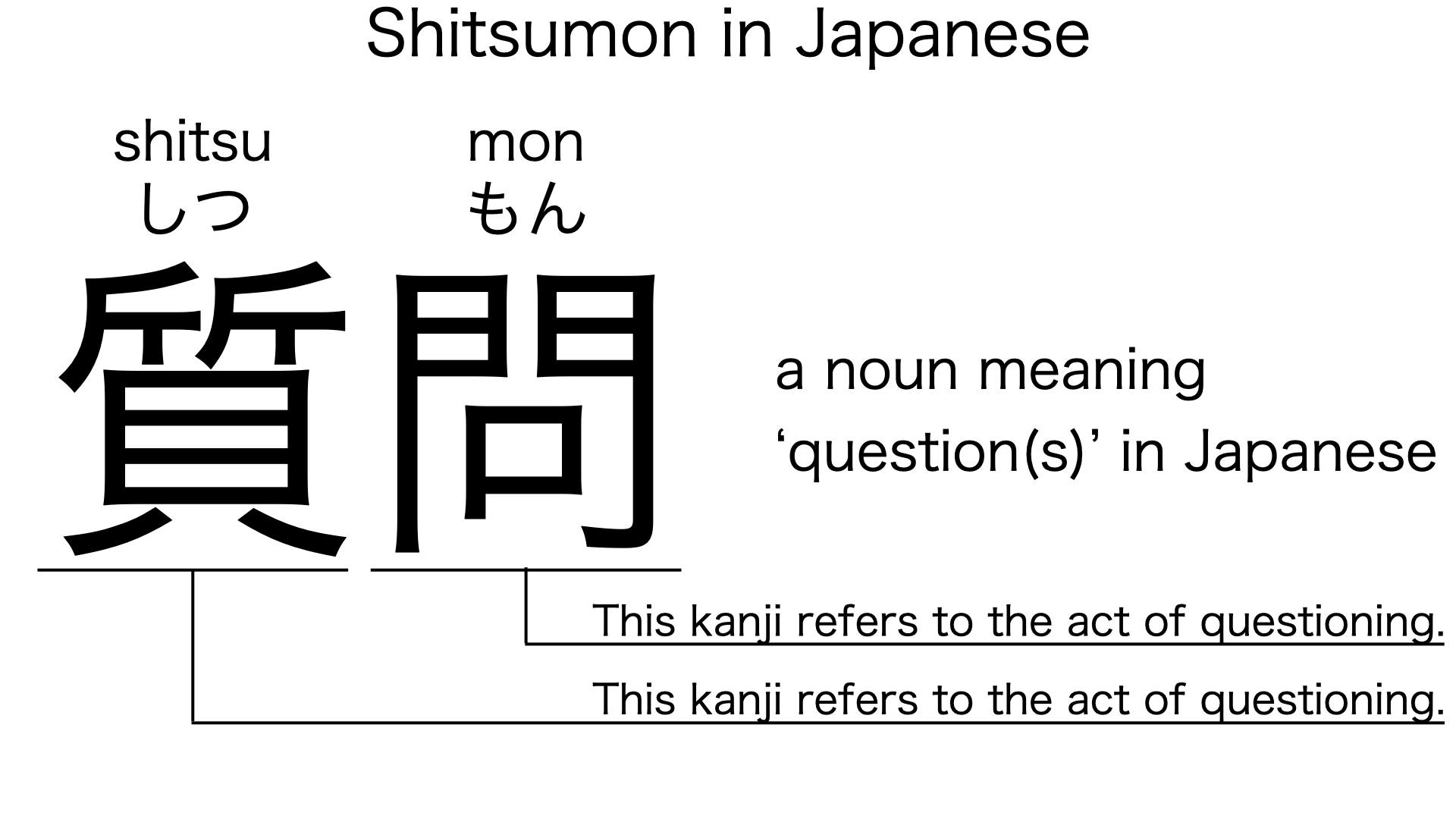What does “shitsumon” mean in Japanese?
Native speakers say “shitsumon” to mean ‘question’ in Japanese. Perhaps, some Japanese learners know this word as it is sometimes used in Japanese textbooks. In this blog post, however, I will explain this word in detail based on its kanji expression. And also, I will explain how to use it through example sentences. My explanations would help Japanese learners understand “shitsumon” more clearly. Then, let’s get started!
Contents
Definition and meaning of “shitsumon”
Let me start with the definition and meaning of “shitsumon”.
- shitsumon – 質問 (しつもん) : a noun meaning ‘question’ in Japanese. This can also work as plural. Learn more about Japanese plural.
The definition and meaning are simple and clear. To understand this noun more clearly, however, let me explain its kanji characters in detail, one by one.
What does “shitsumon” literally mean in Japanese?
The kanji expression of “shitsumon” consists of the following two kanji characters:
- 質 : a kanji character occasionally used to refer to the act of questioning.
- 問 : a kanji character often used to refer to the act of questioning.
From these two kanji characters, we can understand that the formed noun literally means ‘questioning’ in Japanese. This literal interpretation is very close to the actual meaning.

When we meet new kanji expressions, we should check their kanji characters in detail to understand their meanings clearly and deeply. In many cases, kanji characters tell us a lot about the meanings of the expressions they form. Actually, here, we could get the better understanding of “shitsumon” through the detailed kanji check above.
So far, I’ve explained the definition and meaning of “shitsumon” together with its kanji characters. Then, let me explain how to use it through the example sentences below.
Example #1: how to say “question” in Japanese
sumimasen, shitsumon ga ari masu – すみません、質問があります (すみません、しつもんがあります)
Excuse me, but I have a question.
Below are the new words used in the example sentence.
- sumimasen – すみません : a phrase meaning ‘excuse me’ or such in Japanese.
- ga – が : a case particle used to make the subject word or the object word in a sentence. In the example, this is used after “shitsumon” to make the subject in the sentence.
- ari – あり : one conjugation of the verb, “aru”, which means ‘to be’, ‘to exist’, ‘to have’, or such in Japanese. In the example, it has been conjugated for the better connection with its following word.
- masu – ます : an auxiliary verb used after a verb to make it polite. Probably, this is well known as a part of Japanese masu form. In the example, this is used after “ari” to make it sound polite.
This is a typical usage of “shitsumon”. In this example, it works together with the case particle, “ga”, to become the subject in the sentence.
The original meaning of the Japanese sentence is more like “excuse me, but there is a question”, but it is often understood as “excuse me, but I have a question.” It’s worth knowing, I think.
Example #2: another usage of “shitsumon”
kono shitsumon wa totemo muzukashii desu – この質問はとても難しいです (このしつもんはとてもむずかしいです)
This question is very difficult.
Below are the new words used in the example sentence.
- kono – この : a determiner used before a noun which refers to something close to the speaker. In the example, this is used before “shitsumon” to say “this question” in Japanese.
- wa – は : a binding particle working as a case marker or topic marker. In the example, this works after “kono shitsumon” to make the subject in the sentence.
- totemo – とても : an adverb of degree meaning ‘very’, ‘much’, ‘so’, or such in Japanese. In the example, this works in front of “muzukashii” to emphasize its meaning.
- muzukashii – 難しい (むずかしい) : an i-adjective meaning ‘difficult’ in Japanese.
- desu – です : an auxiliary verb used after a noun or adjective to make it polite. Probably, this is well known as a part of Japanese desu form. In the example, this is used after “muzukashii” to make it sound polite.
This is another typical usage of “shitsumon”. In this example, it works together with the determiner, “kono”, to mean ‘this question’ in Japanese. When we want to mean a ‘question’ or ‘questions’ in Japanese, anyway, this noun is always a very good option.
Summary
In this blog post, I’ve explained the definition and meaning of “shitsumon” in detail based on its kanji expression. And also, I’ve explained how to use it through the example sentences. Let me summarize them as follows.
- shitsumon – 質問 (しつもん) : a noun meaning ‘question’ in Japanese. This can also work as plural. These two kanji characters literally mean ‘questioning’ in Japanese. This literal interpretation is very close to the actual meaning.
Hope my explanations are understandable and helpful for Japanese learners.
Leave a Reply